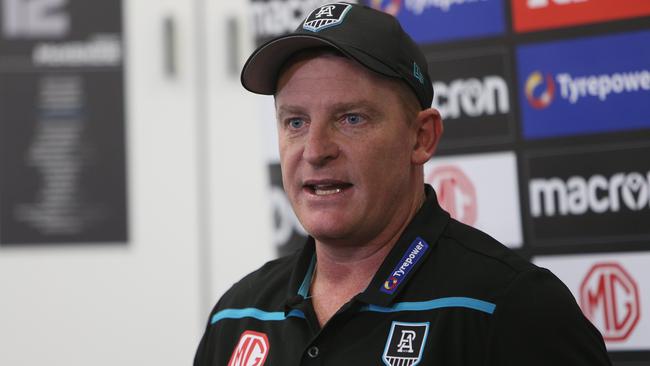Fears for health of coaching staff as cost-cutting takes its toll
John Longmire and Michael Voss are the latest AFL figures to raise concerns about the impact of the COVID-19 cost-cutting measures.

Experienced AFL coaches are increasingly concerned about the impact the COVID-19 cost-cutting measures introduced during the pandemic last year are having on the health of industry employees.
Brisbane legend and Port Adelaide assistant coach Michael Voss told The Australian there was a potential for problems as those left employed in football make do with far fewer workmates.
Sydney’s premiership coach John Longmire believes the AFL cut too far when introducing the drastic savings measures across the competition in the infancy of the COVID-19 crisis.
The AFL introduced cuts to the soft cap equating to more than $3 million per club for 2021 and clubs and coaches are feeling drained a third of the way through the 2021 season.
“There is a trim with a knife, then there’s a cut with a chainsaw. I’m not sure we’ve got the mix quite right,” Longmire said.
“The real challenge for the industry is there’s a lot of really good people working in the industry. But they are working enormous hours and putting themselves, and their families in some cases, under some stress.
“There has to be an acknowledgment from the AFL that that is the case. It’s not about getting the violin out. It is just a fact.”
Nathan Buckley estimated last month that coaches are doing 130 to 140 per cent of their workload in recent years.
Luke Beveridge said recently he shunned radio interview requests because he was “out of juice”.
Voss, who is mentoring former army personnel transitioning into civilian life as part of a Port Adelaide funded program, said those left in the industry were dealing with a far heavier workload.
“My concern is with how expendable coaches have become. The fallout has been loading up on coaches,” he told The Australian.
“Six coaches are now doing what 10 coaches used to do. Everyone has their heads down and we are working as hard as we can. But you can’t do that for a sustained period of time without breaking people.
“If, as an industry, we are concerned about our people, there are things to be addressed and that is not just your coaches. You don’t want to make that a human toll as well.”
A portion of AFL and club employees who were stood down in the infancy of the COVID-19 season suspension in 2020 never returned to their roles.
Administration, marketing, media and welfare departments were among the areas gutted in a bid to keep afloat amid dire fears as to the ability of the AFL to survive the pandemic.
The introduction of a limit of 25 staff allowed to have contact with players last year led to an exodus of specialist coaches, part-time and casual staff.
Recruiting departments were cut, which means there are now fewer people watching junior talent across the country, with clubs relying more on volunteers and spotters for some regions.
At the end of last season, eight experienced club doctors vacated their roles. In part, it was due to a dip in the money offered to continue, but there was also an expectation to contribute even more hours than before.
With the season running later than usual, everything from the trade period to the national draft was also forced further back in 2020, which meant club employees had less time to refresh for the 2021 season.
Some league and club employees are also involved in the AFLW, which started in late January and ran through until last month, which adds to the stress of their roles.
“Most footy departments are on skeleton staff, when you look at their need to service a senior men’s program, a reserves program and, in many cases, a women’s program,” Longmire said.
“(It is) not just coaches. (It is) admin staff, conditioning staff, medical staff. When you’re trying to put together a number of different footy programs, it can be a real challenge.
“Most people in the industry work six-and-a-half days a week. Hopefully there is some acknowledgment, at some point, that it is tough to expect people to continue to do that.”



